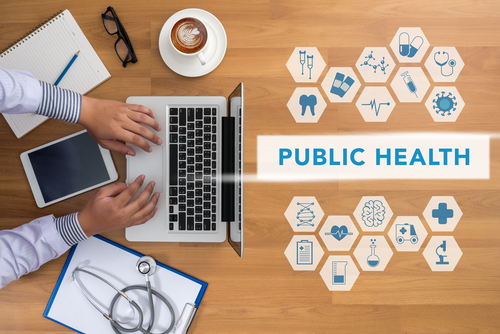
The Benefits of Earning a Public Health Degree
Did you know that public health professionals helped increase life expectancy in the United States by more than 30 years over the past century?
Despite these advances, significant health challenges remain, such as rising healthcare costs, chronic diseases, and health disparities. If you're passionate about solving these problems and making a difference in your community, earning a Doctor of Public Health (DrPH) degree could be the key.
Online DrPH programs offer the flexibility to balance work, study, and personal life, allowing you to advance your education without compromising your current responsibilities. Today, we will explore the many benefits of earning a public health degree, focusing on the ability to drive public health policy, addressing health disparities, and fostering community health programs.

-
Driving Public Health Policy
One of the most significant benefits of earning a public health degree is the opportunity to influence and shape public health policy. Graduates with a DrPH degree are well-positioned to take on leadership roles in government agencies, non-profit organizations, and international health bodies where they can advocate for evidence-based policies that improve health outcomes. Public health professionals play a crucial role in developing and implementing policies that address a wide range of health issues, from infectious disease control to chronic disease prevention and health promotion.
For example, an online DrPH degree prepares graduates to be instrumental in shaping policies related to tobacco control, vaccination programs, and the management of health emergencies like the COVID-19 pandemic. By leveraging their expertise in public health, these professionals can drive policy changes that have a far-reaching impact on population health. The ability to influence policy at local, national, and global levels is a powerful motivator for many individuals pursuing a public health degree.
Addressing Health Disparities
Earning a public health degree provides the knowledge and skills needed to identify, understand, and address the root causes of health disparities. Graduates can design and implement programs that target vulnerable populations, ensuring that everyone has access to the resources and services they need to lead healthy lives.
Public health initiatives aimed at reducing disparities often focus on improving access to healthcare, enhancing health education, and addressing social determinants of health such as poverty, education, and housing. For instance, programs that provide free or low-cost health screenings and vaccinations to underserved communities have proven effective in improving health outcomes and reducing disparities.
Fostering Community Health Programs
Public health professionals play a vital role in designing and implementing community health programs that promote wellness and prevent disease. Earning a public health degree provides the skills needed to develop effective programs tailored to the specific needs of communities. These programs can range from health education campaigns and vaccination drives to initiatives aimed at promoting physical activity and healthy eating.
Successful community health programs often involve collaboration with local organizations, schools, and healthcare providers to ensure a comprehensive approach to health promotion. For example, a community health program might include workshops on nutrition and cooking classes, fitness challenges, and partnerships with local farmers' markets to increase access to fresh produce.

Enhancing Emergency Preparedness
A public health degree equips graduates with the knowledge and skills needed to prepare for, respond to, and recover from emergencies such as natural disasters, disease outbreaks, and bioterrorism events. Effective emergency preparedness involves coordination with various agencies and organizations, as well as the ability to communicate critical information to the public.
For instance, during the COVID-19 pandemic, public health professionals were at the forefront of efforts to manage the crisis, from developing and implementing testing and vaccination strategies to providing accurate information and guidance to the public. Their expertise in epidemiology, emergency response planning, and risk communication was crucial in mitigating the impact of the pandemic.
Promoting Mental Health Awareness
Mental health is a crucial aspect of overall health, and public health professionals are increasingly focusing on mental health awareness and support. A public health degree provides the tools to understand the complexities of mental health issues and to develop strategies to address them. Public health professionals work to reduce the stigma associated with mental health, promote mental wellbeing, and ensure that individuals have access to the necessary resources and support.
Programs aimed at promoting mental health awareness can include public education campaigns, school-based interventions, and community support groups. For instance, public health initiatives may involve training educators and community leaders to recognize signs of mental health issues and provide appropriate support.
Leading Health Education Efforts
A public health degree provides the skills to design and implement effective health education campaigns that raise awareness and promote healthy behaviors. These efforts can include workshops, public service announcements, social media campaigns, and community events.
For instance, health education campaigns might focus on topics like vaccination, smoking cessation, nutrition, and exercise. Public health professionals use evidence-based strategies to communicate important health information in a way that is accessible and engaging for different audiences. By leading health education efforts, public health professionals empower individuals to make informed decisions about their health and wellbeing.
Advocating for Health Policy Change
Public health professionals use their knowledge and expertise to influence policymakers, raise public awareness, and drive change at local, national, and global levels.
For example, public health advocates have successfully pushed for policies such as smoke-free laws, sugary drink taxes, and regulations on harmful chemicals. They work to ensure that health policies are based on scientific evidence and that they address the needs of all populations, particularly the most vulnerable. Through advocacy, public health professionals help create a healthier and more equitable society.
Conclusion
Earning a public health degree offers numerous benefits, from the opportunity to influence public health policy and address health disparities to integrating technology in health and fostering community health programs. Public health professionals play a critical role in enhancing emergency preparedness, participating in global health initiatives, promoting mental health awareness, collaborating with multidisciplinary teams, leading health education efforts, and advocating for health policy change. A public health degree equips graduates with the skills and knowledge needed to make a significant impact on health outcomes, both locally and globally. By pursuing a public health degree, individuals can embark on a rewarding career dedicated to improving health and wellbeing for all.
SIIT Courses and Certification
Also Online IT Certification Courses & Online Technical Certificate Programs

